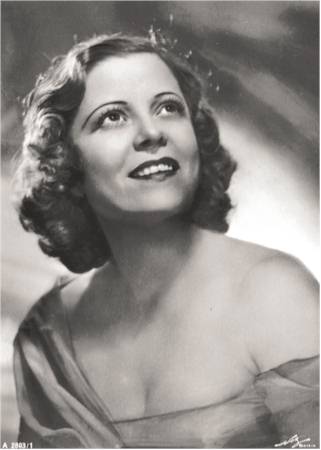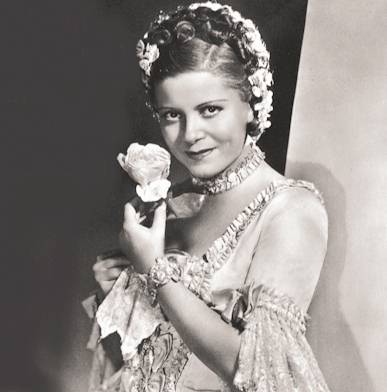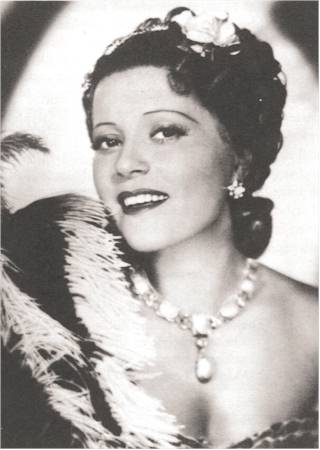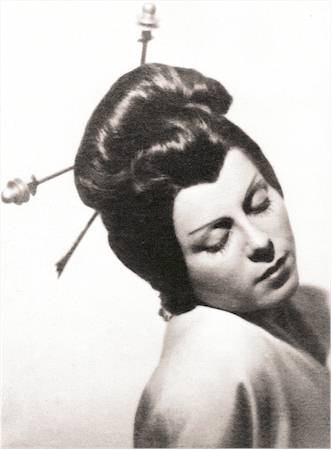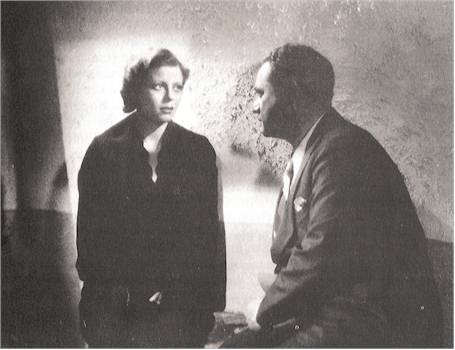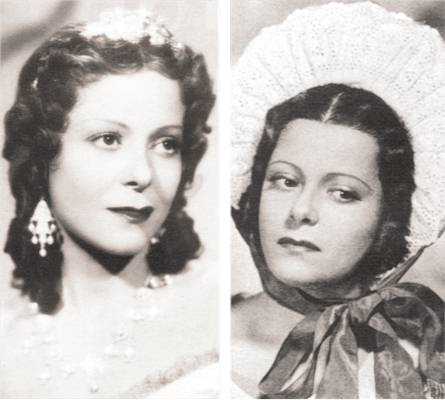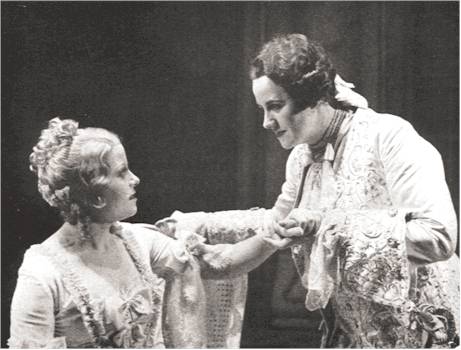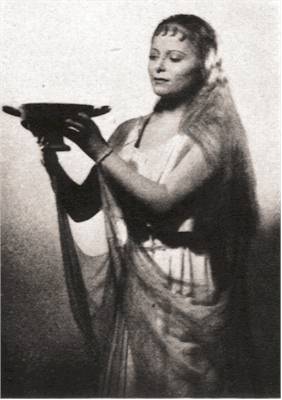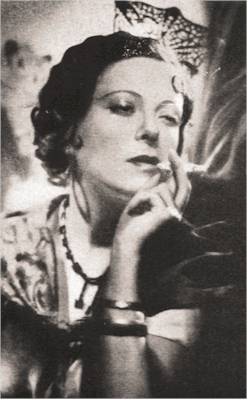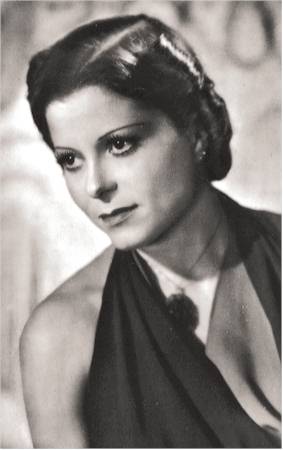Moldavian-Austrian soprano, 1910 - 1949
Biographical notes: She was born Maria Cebutaru in Chisineu (then Russia-Bessarabia) where she grew up speaking
Romanian and Russian. She discovered a singing voice at the age of four, singing in churches. One day, a troupe of Russian emigré actors from Moscow arrived and performed in her hometown. As
it happened, they needed a young actress who could also sing in Russian, and as she was already known for her beautiful voice and because of her charming appearance, she was invited by the
actor and manager Count Alexander Virubov to perform some Russian songs. Virubov fell in love with her. He planned to go to Paris and she decided to join him. Soon afterwards, the two got
married. After a short stay in Paris they moved to Berlin where Virubov hoped to make a film. Maria was heard by Oscar Daniel, a professor at the Berlin Music School, who gave her a three
months’ training (!). Fritz Busch at the Dresden Opera heard her and gave her a contract for three years! In turn Bruno Walter engaged her for the Salzburg Festival. What a start for a
21-year-old singer! In the meantime she was fluent in German after a short time. Cebotari made her outstandingly successful debut as Mimì at Dresden, but she also took part in modern operas
and created roles in operas by d’Albert, Lothar, Heger and Sutermeister. The most important creation was Aminta in Richard Strauss’ Die Schweigsame Frau. The composer was a great
admirer of the young singer. In 1934, barely 24, she was made “Kammersängerin.” From 1935 she appeared regularly at the Berlin State Opera and became one of the most versatile singers. A
selection of her repertoire: Butterfly, Daphne, Mimì, Aminta, Antonida, Carmen (!), Salome, Turandot, Maddalena, the Olympia, Antonia and Giulietta in Les Contes d’Hoffmann, Gabriele in
Schoeck’s Das Schloss Dürande, Susanna, Zerlina, Sophie, Countess Almaviva, Konstanze, Tatyana, Violetta, Arabella, Eurydike and Donna Anna. She appeared as a guest star at various
opera houses, in Zurich, Munich, Rome, Amsterdam, Stockholm, Basle, Berne and Prague. She became very popular in Italy with her appearances at la Scala, at the Teatro di Fenice and at the
Maggio Musicale Fiorentino. In 1936 and 1947 she was invited to Covent Garden (1936 as Zerlina, Sophie and Susanna, 1947 as Countess Almaviva and Donna Anna). The artist enjoyed a
tremendous success as Salome. She appeared regularly at the Salzburg Festival where she was particularly successful in Mozart operas. As an important figurehead of Nazi Deutschland, she
took part in eight films in which Beniamino Gigli was frequently her partner. In 1938 the couple Virubov separated and she got married to film actor Gustav Diessl (1899 - 1948) with whom she
had two children. Her house in Berlin had been destroyed in 1943, so she was glad to be contracted at the State Opera of Vienna. In 1947 she created Lucile in Gottfried von Einem’s
Dantons Tod. Gustav Diessl suffered two strokes within a short time and died early in 1948. Cebotari, who had earlier told friends that life without Diessl was something she could not
contemplate, had herself little more than a year to live, and in her fortieth year, she was diagnosed with “incurable liver cancer.” Her last appearance was at the Vienna State Opera, as
Laura in Millöcker’s operetta Der Bettelstudent. She died in June 1949. Her two little sons were adopted by the renowned pianist Clifford Curzon.
As Sophie
As Violetta “Once heard - never forgotten.” Lisa della Casa about Maria Cebotari
As Cio-Cio-San Probably her best-known role of all, not least as a result of the Nazi era film “Premiere der Butterfly,” in which she interpreted parts of Puccini’s score and became known as Cio-Cio-San to many who had never seen her in the opera house.
Maria Cebotari in the film “Mutterlied” with Beniamino Gigli (1938)
As Violetta (left) and as Mimì (right)
Maria Cebotari (Sophie) and Tiana Lemnitz (Octavian), Berlin State Opera, 1937 Comment:
As we can learn from her repertory, Maria Cebotari was an extraordinarily versatile singer. She was often considered a “predecessor” to Maria Callas. Indeed, the two sopranos had a great deal
in common. Both were true artists of great musicality and totally committed to their art. Both were utterly “reliable,” never missing an entry or a rehearsal. They would never come along
half-knowing the music, and they could be entrusted with something new and it would be learnt quickly and intelligently. No wonder that the two Marias were loved by all great conductors. And
last but not least, their lives were such as dreams and films are made of, ranging from passion, love, divorce, professional success and personal tragedies.
With the underlying darkness of her soprano, a pronounced vibrato and brilliance at the top of her range - but above all with the intelligence, intensitiy and sheer energy, she did justice to
every role. She was one of the very few singers who succeeded in lyrical, dramatic and coloratura parts. The juxtaposition of roles of very different kinds was one of Cebotari’s
hallmarks from the very outset. In Berlin, she managed to sing the title role in Carmen (!) and Susanna in Le Nozze di Figaro on two consecutive evenings, likewise in Vienna Mimì and Salome!
Four composers were essential for her short career: Mozart, R. Strauss, Verdi and Puccini. When listening to Cebotari’s recordings, one cannot but wonder about the unexpected artistic
and musical quality of the recordings. In 1943/44, when many of her recordings were made, it was a matter much admired that the Berlin authorities were able to achieve such a standard of
performance in the middle of a war in which thousands were dying every day. Our feelings today are understandibly mixed. I think, we should be aware of the combination of art and barbarism
which was so characteristic in the Third Reich. Maria Cebotari was undoubtedly one of its exponents.
As Salome
As Carmen Do not miss listening to her superb Salome (final scene), a record as outstanding as that of Ljuba Welitsch. If you have the opportunity to watch her in a film (the best is probably Premiere der Butterfly), you will get an idea of her art, her charming appearance, her beauty, and you will understand why she was so popular. Her fiery Saffi belongs to the best operetta recordings ever made.
|
|||||||||||||||||||||||||||||||||||||||||||||||||||||||||
